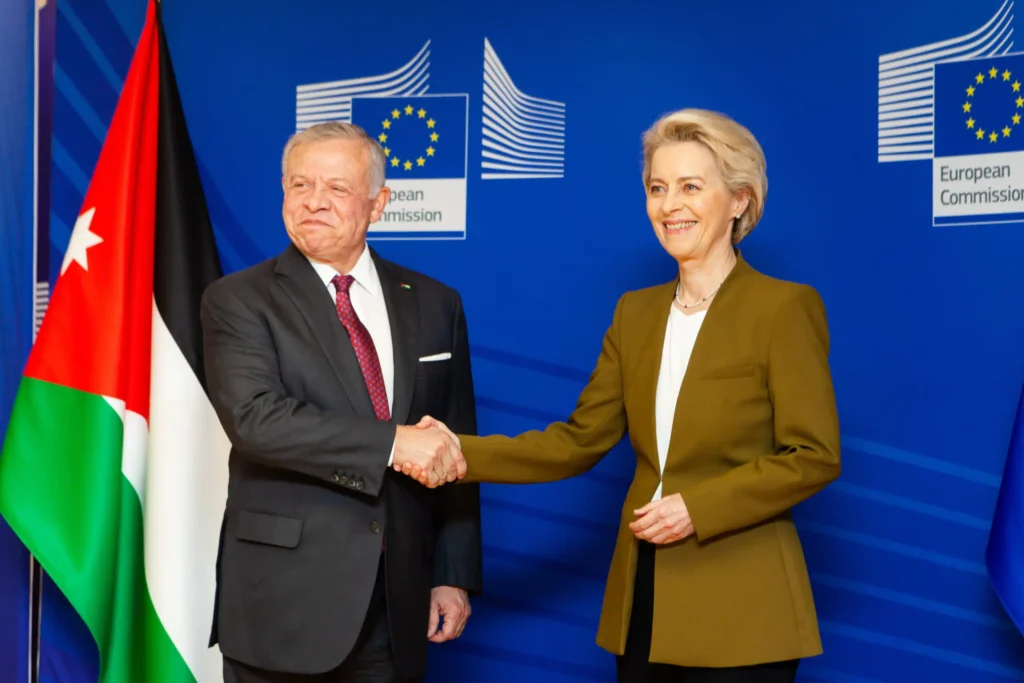Key Takeaways:
- EU strengthens migration controls with Jordan and Morocco: The European Union is finalizing agreements to curb migration flows in exchange for economic cooperation.
- Criticism over human rights issues: Deals with Tunisia and Egypt have faced backlash due to allegations of human rights abuses, raising concerns about similar challenges with Jordan and Morocco.
- Strategic focus on trade, energy, and border management: These agreements include comprehensive cooperation on trade, energy, and stricter border controls.
- Legal and political complexities: Disputes over Western Sahara and compliance with human rights clauses could impact the deals.
The European Union, grappling with increasing migration pressures and rising support for far-right, anti-immigrant parties, is on the brink of signing multibillion-euro agreements with Jordan and Morocco. These deals, focused on reducing migration flows, aim to balance economic support with enhanced border control measures, marking a pivotal moment in the EU’s external migration strategy.
Jordan: A Key Partner in Refugee Management
Jordan’s role as a host to over a million Syrian refugees places it at the center of the EU’s migration efforts. According to EU Commissioner Dubravka Šuica, an agreement with Jordan is “almost ready” and is expected to be finalized by early 2025 during King Abdullah’s visit to Brussels. This deal seeks to provide Jordan with financial and strategic assistance, helping the country manage its significant refugee population while supporting EU migration objectives.
EU Commission President Ursula von der Leyen recently emphasized the importance of this partnership, noting that it would also address broader political challenges in the Middle East, including fostering a transition in Syria. For Jordan, this agreement promises much-needed economic relief as it continues to bear the humanitarian and financial burdens of regional instability.
Morocco: A Strategic Transit Country
Morocco, already a long-standing partner in migration control, is set to enhance its cooperation with the EU. From 2014 to 2022, Morocco received over €2.1 billion from Brussels to deter migration. The upcoming agreement will expand this collaboration, covering trade and energy projects alongside stricter border control measures.
However, political sensitivities surrounding Western Sahara—a disputed territory claimed by Morocco—add complexity to the negotiations. The European Court of Justice recently ruled against a previous EU-Morocco fishing and agriculture deal, citing violations of self-determination for the people of Western Sahara. This ruling underscores the delicate balance required to finalize the new agreement without breaching international legal standards.
Balancing Migration Management and Human Rights
The EU’s recent migration deals with Tunisia and Egypt highlight the challenges of balancing strategic interests with human rights concerns. Both countries have faced accusations of violating migrants’ rights, sparking criticism from activists and politicians. Tunisia, for example, has been accused of deporting migrants under inhumane conditions, while Egypt’s human rights record remains under scrutiny.
Commissioner Šuica stressed that all partner countries must meet human rights criteria outlined in the agreements. She assured that no funds would be disbursed until these criteria are fulfilled, signaling the EU’s intention to maintain accountability despite growing pressures to curb migration.
The Bigger Picture: Migration Management as a Shared Responsibility
In my opinion, these agreements represent a double-edged sword. On the one hand, they provide a pragmatic approach to managing migration by engaging neighboring countries with shared economic and political interests. On the other hand, they risk compromising the EU’s commitment to human rights, especially if these standards are not rigorously upheld.
As the EU continues to navigate these complex partnerships, the stakes remain high. Effective migration management requires collaboration, transparency, and a commitment to the values that define the European Union. Whether these deals will achieve a balance between control and compassion remains to be seen, but they undeniably mark a significant step in the EU’s approach to one of its most pressing challenges.
#
Source: Financial Times










